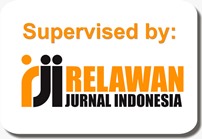PENGARUH KEPERCAYAAN DAN KEPUASAN TERHADAP LOYALIATAS MAHASISWA DI SEKOLAH TINGGI ILMU EKONOMI (STIE) PASAMAN KABUPATEN PASAMAN BARAT
Abstract
Students with high loyalty are the assets of Higher Education because they will provide positive recommendations and encourage friends, relatives and other communities to make choices and use the education services they have experienced. The purpose of this research is (1) To know how influence of trust toward student loyalty in STIE Pasaman, (2) to know how influence of satisfaction to student loyalty in STIE Pasaman, (3) To know how the influence of trust and satisfaction on student loyalty in STIE Pasaman. Sampling is used Probability Sampling by using slovin formula, where the sample amount is 85 people. The result of multiple linear regression analysis can be interpreted that the variable of trust, and satisfaction have positive and significant effect on loyalty because it has significant value less than α = 0,05. Based on the joint influence between the trust, and satisfaction on the loyalty of STIE Pasaman students is 59.3% (R2 = 0.610). Means 39% influenced by other variables not included in this study.
Full Text:
PDFReferences
Andi Sunarto, (2009), Seluk Beluk E-Commerce, Graha Ilmu, Yogyakarta.
Garbarino, Ellen, Mrk S Johnson, 2009. The Different Roles of Satisfaction, Trust, and Commitment in Customer Relationship, Journal of Marketing, vol. 63 (April), pp 70 – 87.
Gurviez, Patricia dan Michael Korchia. 2003. Test of a Consumer-Brand Relationship Model Including Trust and Three Consequences. Makalah Seminar dalam 30 tahun International Research Seminar in Marketing. 11-13 Juni
Hurriyati, Ratih. (2010). Bauran Pemasaran dan Loyalitas Konsumen. Bandung: ALFABETHA.
Howard, J.A. and Sheth J.N. 1969,The Theory of Buyer Behavior. (Edisi cetak ulang) New York: John Wiley and Sons
Indriantoro, dan Supomo, 2002.Metodologi Penelitian Bisnis untuk Akuntansi dan Manajemen,Edisi Pertama, BPFEYogyakarta, Yogyakarta
Kotler, Philip and Gary Armstrong. 2012. Prinsip-prinsip Pemasaran. Edisi 13. Jilid 1. Jakarta: Erlangga.
Kotler Philip, Amstrong Gary. 2013. Prinsip-prinsip Pemasaran, Edisi ke-12.Penerbit Erlangga.
Kuncoro, Mudrajat. 2007. Metode Riset untuk Bisnis & Ekonomi, UUP STIM YKPN,Yogyakarta.
Lovelock Christopher. et. al. 2010. Pemasaran Jasa, Edisi 7, Jilid 2. Erlangga: Jakarta
Lovelock, Chirstoper dan Jochen Wirtz. 2011. Service Marketing. New Jersey USA : Pearson
Malhotra Naresh K, 1993. Marketing Research and Applied Orientation. USA: Prentice Hall International
Prahardikatama, Hendia. (2013). Hubungan Kepercayaan Konsumen Terhadap Niat Beli Secara Online Di Tokobagus.Com Wilayah Kota Bandung: Universitas Widyatama.
Philip Kotler, 2005, ManajemenPemasaran, Jilid I dan II, PT. Indeks, Jakarta
Robinette, Scott. 2001. Emotion Marketing. Jakarta : Mc.Grow Hill Book Company.
Sopiatin, Popi. (2010). Manajemen Belajar Berbasis Kepuasan Siswa. Bogor: Ghalih Indonesia.
Suprapti,N.W.S. 2010. Perilaku Konsumen : Pemahaman Dasar dan Aplikasinya dalam Strategi Pemasaran. Bali:Universitas Udayana Bali.
Sugiyono (2009). Metode Penelitian Kunatitatif Kualitatif dan R&D. Alfabeta. Bandung
DOI: https://doi.org/10.31846/jae.v5i2.5
Refbacks
- There are currently no refbacks.

This work is licensed under a Creative Commons Attribution-NonCommercial-NoDerivatives 4.0 International License.
e-Jurnal Apresiasi Ekonnomi Indexed by:












